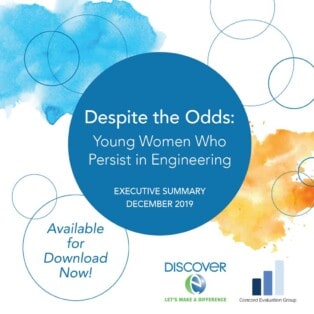 The key to engaging girls in engineering remains educating them about the profession’s value — how they can achieve success, earn a fulfilling living, and make a difference in the world, the analysis of peer-reviewed literature found.
The key to engaging girls in engineering remains educating them about the profession’s value — how they can achieve success, earn a fulfilling living, and make a difference in the world, the analysis of peer-reviewed literature found.
Girls and young women also need to hear messages that let them internalize a positive message: That engineering is a learnable, transferable skill.
“They can then ask, ‘How are you setting yourself up for the future of work in a globally competitive environment?’” said Thea Sahr, director of communications and programs for DiscoverE, the nonprofit organization that organizes Engineers Week and Girl Day (formerly Introduce a Girl to Engineering Day). DiscoverE conducted the study, titled “Despite the Odds: Young Women Who Persist in Engineering,” in partnership with Concord Evaluation Group. The literature review comprised studies of girls in K-12 and young women through graduate school who succeeded in engineering studies and went on to engineering careers.
The most important factors young women demonstrated when they chose and persisted in pursuing engineering careers were:
- Interest in and positive attitudes toward engineering
- Recognition of the value of engineering as a profession
- Self-confidence that they have the skills and knowledge to do the work
- Self-identifying as STEM professionals: “This is who I am.”
- Having a strong support network
- Having the ability to draw strength from personal or cultural experiences and struggles
- Feeling a sense of belonging
Women of color — both Latina and African-American — particularly required a strong support network to persevere, Sahr said.
“They needed strong family support; support of each other; and the ability to build networks,” she said. “Also, their ability to draw on a past struggle, to overcome present-day struggles — grit and resilience. It stood out that those were two hallmarks. That’s how they were surviving and thriving.”
The studies revealed some unexpected findings, too, Sahr said:
- While reaffirming that introducing girls to engineering in elementary and middle school is vital, the introduction needs to be followed up with more sustained engagement.
- Girls maintained their interest and achievements in science, technology, engineering, and mathematics (STEM) in schools where STEM studies were integrated into the curricula. They outranked their peers who attended STEM-specific schools located inside larger schools.
- The peer-reviewed literature focused on STEM as a lumped-together topic, which could offer researchers an opportunity to propose studying engineering as its own topic.
- While studies show that programs such as Future City, Dream Big, and “Invent It. Build It.” can help students connect their values with engineers’ work, more empirical research is needed to link students’ values with their decisions to pursue engineering as a profession.
- An intriguing finding revealed that differences in students’ academic performances in high school mattered less than a positive attitude in predicting a student’s persistence in pursuing STEM degrees and majors in university.
- High self-efficacy — a student’s belief in her ability to accomplish a task and succeed in specific situations — was a major characteristic of African American girls who enrolled in advanced courses required to pursue postsecondary engineering studies. Yet the relationship between self-efficacy and a girl’s decision to study engineering in university remains ripe for more research.
- One study revealed six keys to female African American university engineering students’ persistence in pursuing their careers: an active involvement with the black community on campus; a strong desire to give back and inspire the next generation of engineers; faith, family, and community; a firm identity and strong sense of self; being proud, passionate, and committed to being an engineer; and being advocates for themselves. Once again, researchers could mine the topic for more details.
- High-school students still listen to their parents — at least in terms of choosing STEM fields as university majors. Students with high encouragement from their parents were most likely to major in STEM fields. This particular study found that parents’ expectations, their level of participation in their children’s schools, and their own STEM engagement were all positively related to students’ postsecondary enrollment.
Indeed, family and community support proved to be the most salient factor that women of color identified as furthering their completions of STEM degrees. Parents and role models played particularly significant roles in encouraging female students to choose and persist in engineering programs.
- Female mentors who guided female engineering students early in the students’ university careers cemented the young women’s sense of belonging, another study revealed. “Fully 100% of the students provided with female mentors stayed in their engineering courses, while 89% of female students without mentors and 82% of students with male mentors remained,” the study found.
- A student’s mentors need not necessarily be faculty, other research showed. Graduate students proved to be positive influences for undergraduate women students who persisted in STEM majors.
- Strong social and cultural capital make a difference, especially for women from underrepresented backgrounds. One study showed Latinas drew “strength from a personal or inherited experience of struggle along their trajectories through engineering.” They realized that anyone’s journey includes obstacles, and they were able to transform that knowledge into motivation to work harder.
- The Latina students also believed that overcoming obstacles “is crucial both to repaying the debt of sacrifice of those who came before and paving the way for those who will come after.” Once again, the philosophy appears ripe for more empirical research.
DiscoverE will leverage the report’s subject matter in its free online conference, the Global Marathon, in which women in engineering and technology discuss vital issues for five consecutive Wednesdays, from March 11 through April 8.
The 2020 Global Marathon will cover:
- Why I stayed in engineering
- Believe, do, succeed (how to increase one’s confidence)
- Turning obstacles into opportunity
- Better together (two speakers sharing their career stories, along with actionable career advice)
DiscoverE’s Sahr said the group’s philosophy is that we’re all stronger together, rowing in the same direction. She said more research is needed, partly to determine whether programs to keep girls and women motivated about engineering require greater investment for expansion. The key will be collaboration and teamwork, she said.
The report is available for download at: http://www.discovere.org/sites/default/files/DespitetheOddsExec%20SummaryFINAL.pdf
“Surviving and Thriving: Why Women Pursue and Stay in Engineering” was written by Sandra Guy, SWE Contributor. This article appears in the 2020 Winter issue of SWE Magazine.







